Items
Tag is exactly
caregiver
-
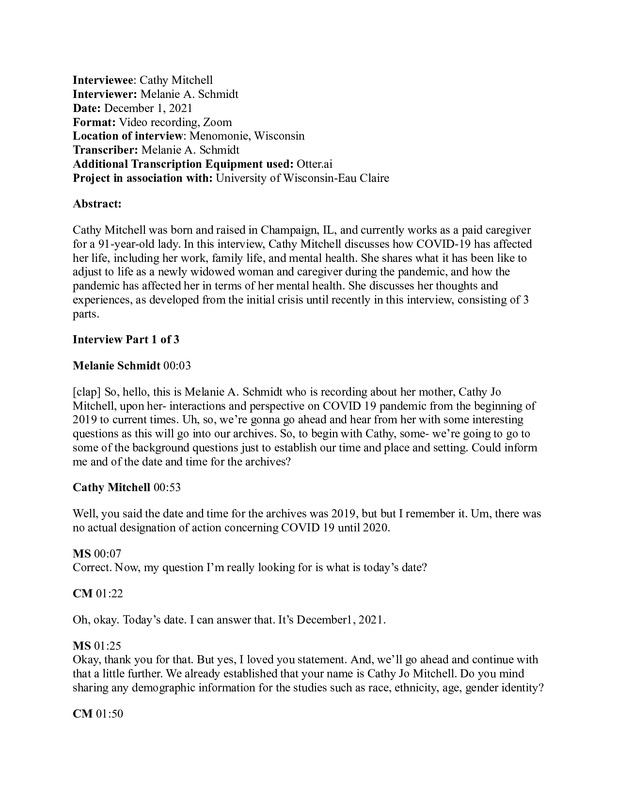 12/01/2021
12/01/2021Cathy Mitchell Oral History, 2021/12/01
Cathy Mitchell was born and raised in Champaign, IL, and currently works as a paid caregiver for a 91-year-old lady. In this interview, Cathy Mitchell discusses how COVID-19 has affected her life, including her work, family life, and mental health. She shares what it has been like to adjust to life as a newly widowed woman and caregiver during the pandemic, and how the pandemic has affected her in terms of her mental health. She discusses her thoughts and experiences, as developed from the initial crisis until recently in this interview, consisting of 3 parts. -
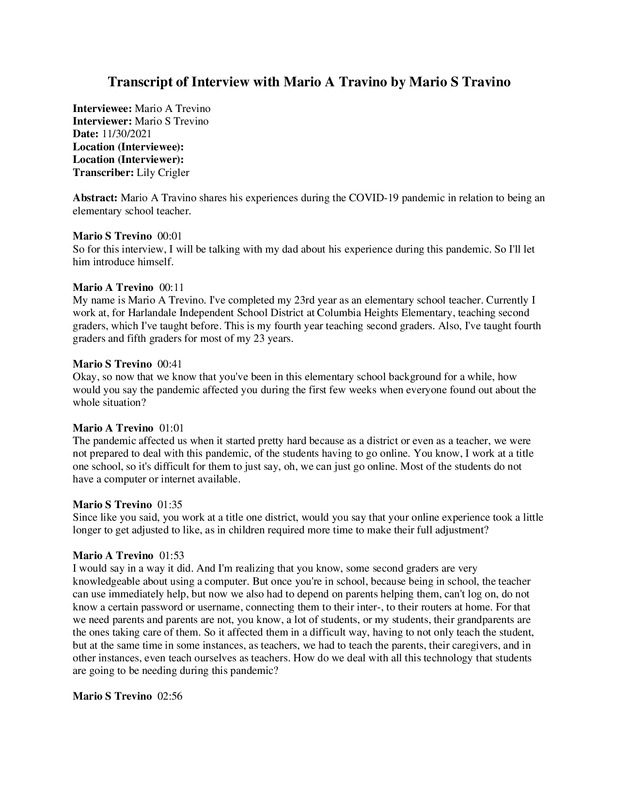 2021-11-30
2021-11-30Mario A Trevino Oral History, 2021/11/30
In order to get a better understanding of the situation in schools during these trying times I felt that we needed to talk to teachers. Getting their side of the story is just as vital as talking with students because in many cases they were just as new to this virtual world as us. So I sat down with my dad who has been a teacher for 20 plus years. I wanted to get his perspective on the situation and talk with him about how teachers felt during this period of transition. -
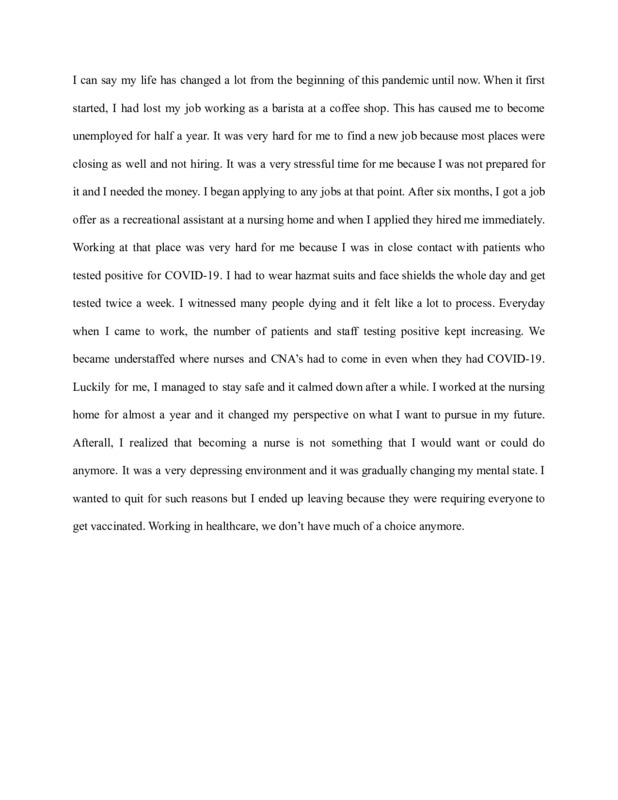 2021-01-01
2021-01-01A Brief Timeline
This brief timeline describes my experience during this pandemic. I decided to share my perspective because I am sure most people can relate. -
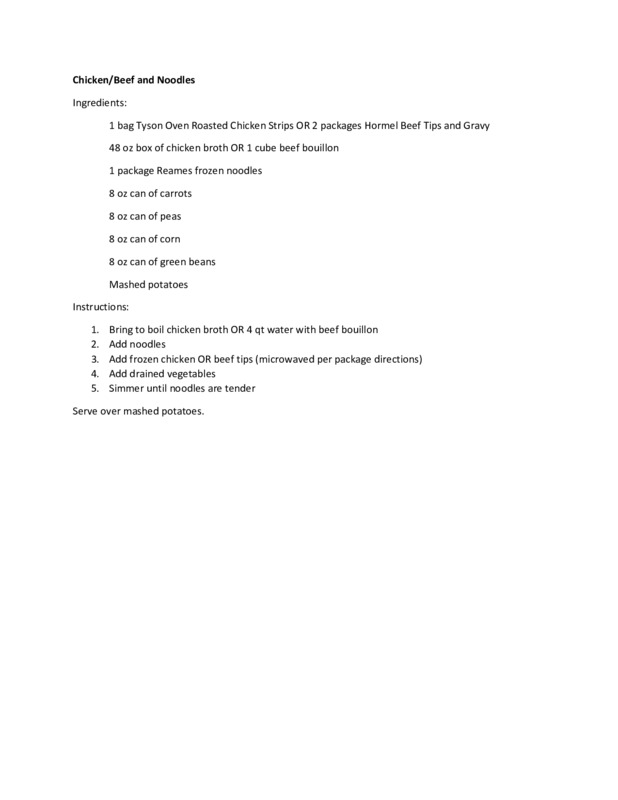 2020-05
2020-05Food Shortages During a Pandemic
While most people tried new recipes during the pandemic, what I remember most is the food shortages that forced me to constantly change what I was planning to make and how I made it. I began using grocery pickup before the pandemic, and since I am a full-time caregiver to my mother who is high-risk for COVID, we continued to use grocery pickup as much as possible to limit any exposure to the virus. Unfortunately, this meant that I could not get halfway through the store, realize that I could not make what I was planning due to unavailable items, and put stuff back and try to buy something else. Though I do have the store substitute most items when they can, especially during lockdown sometimes they couldn’t provide any substitutions, which would leave me without one or two crucial ingredients and unable to fix anything to eat. To combat this, I started getting enough food for two separate dishes for every meal, so if plan A didn’t work out, hopefully plan B would. I also started planning for meals that could be used with the same ingredients, except for one or two, and then get both options just in case one was out of stock. Beef and noodles and chicken and noodles would be one example of this, where the main recipe and ingredients are mostly the same, the only difference being the frozen chicken with chicken broth versus prepackaged beef tips with beef bouillon. Due to their minimal ingredients and their easiness to make, these two interchangeable recipes to me most represent the pandemic and what I fixed the most of during the lockdown and food shortages. I have attached the recipe for both. -
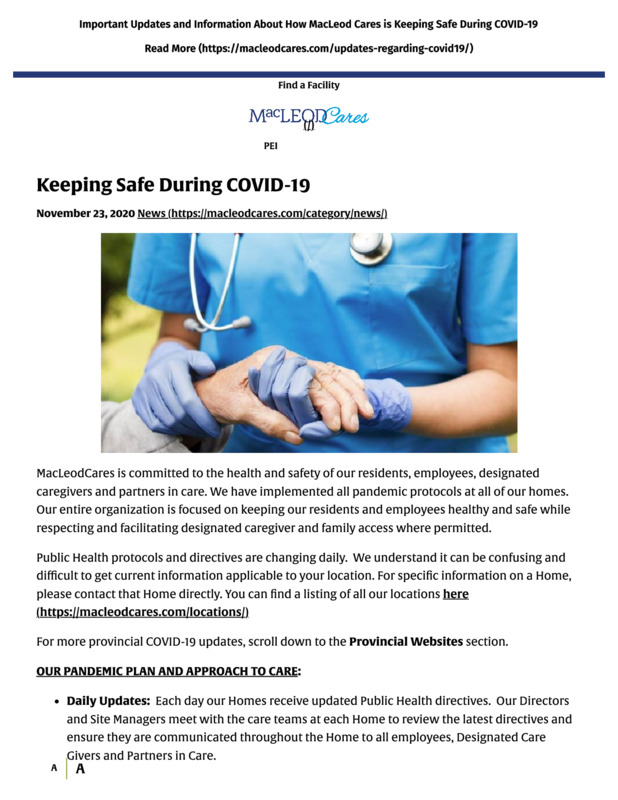 2020-11-23
2020-11-23Keeping Long-Term Care Safe
A statement from MacLeod Cares, a company that manages long term care homes in Atlantic Canada, detailing the measures they have taken to keep their facilities safe during the pandemic -
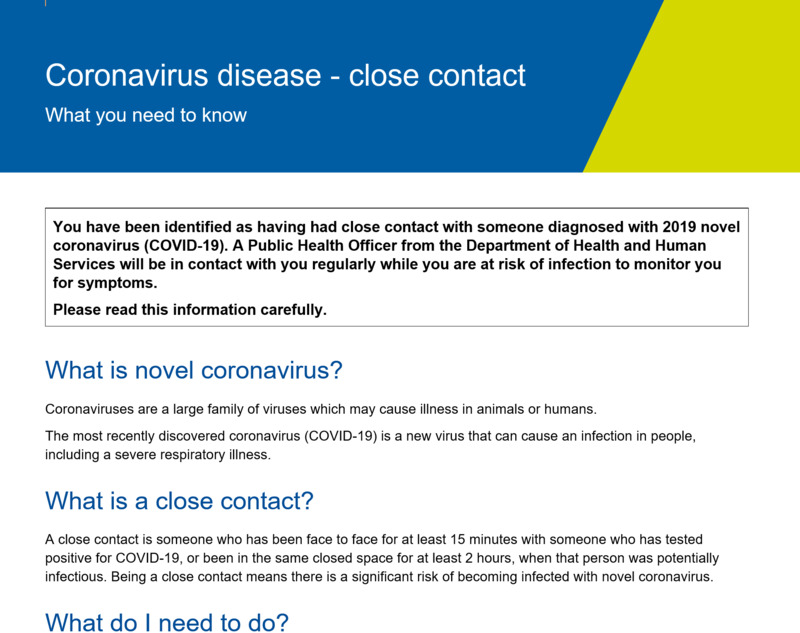 2020-02
2020-02Victorian State Government "Close Contact" fact sheet
Government fact sheet for people who "have been identified as having had close contact with someone diagnosed with 2019 novel coronavirus (COVID-19)", Version 1.3 You have been identified as having had close contact with someone diagnosed with 2019 novel coronavirus (COVID-19). A Public Health Officer from the Department of Health and Human Services will be in contact with you regularly while you are at risk of infection to monitor you for symptoms. Please read this information carefully. What is novel coronavirus? Coronaviruses are a large family of viruses which may cause illness in animals or humans. The most recently discovered coronavirus (COVID-19) is a new virus that can cause an infection in people, including a severe respiratory illness. What is a close contact? A close contact is someone who has been face to face for at least 15 minutes with someone who has tested positive for COVID-19, or been in the same closed space for at least 2 hours, when that person was potentially infectious. Being a close contact means there is a significant risk of becoming infected with novel coronavirus. What do I need to do? Stay at home or in your hotel room • Isolate yourself at home until 14 days after you were last exposed to the infectious person. – You should not leave your house except to seek medical attention. – You should stay in a different room to other people as much as possible. Use a separate bathroom if available. – Do not go to work, school, university, work or attend public places or events. Do not use public transport or taxi services. – Where possible, get others such as friends or family, who are not required to be isolated, to get food or other necessities for you. • If you have difficulties getting food or necessities, call 1800 675 398 for support. • If you need a translator first call 131 450, then request the hotline on 1800 675 398. More information is available on our website: dhhs.vic.gov.au/novelcoronavirus • Please keep Triple Zero (000) for emergencies only. Going outside If you live in a private house, then it is safe for you to go outside into your garden, balcony or courtyard. If you live in an apartment it is also safe for you to go outside into the garden while wearing a surgical mask. You should, however, go quickly through any common areas on the way to the garden. Wear a surgical mask if you have to move through these areas. Monitor your symptoms • Monitor your health until 14 days after you were last exposed to the infectious person. • Watch for any of these signs and symptoms: – fever – cough – shortness of breath • Other early symptoms can include chills, body aches, sore throat, headache, runny nose, muscle pain or diarrhoea. You will be contacted daily by a Public Health Officer to check whether you have had symptoms. What if I develop symptoms? If you develop any of the symptoms listed above: • Call a doctor or hospital and inform them that you have had contact with a confirmed case of novel coronavirus and you have symptoms. • Put on a mask if you have one. • Keep yourself away from others (for example, in a different room). • Do not go to work, school, university, work or attend public places or events. Do not use public transport or taxi services. • When you arrive at the general practice or hospital, tell them again that you are a contact of a confirmed case of novel coronavirus. Your doctor or staff at the hospital emergency department will ensure you are wearing a mask and take you through to a room away from others. The doctor will contact our department on 1300 651 160. They may organise to take nose and throat swabs to send for testing for the novel coronavirus. If you are experiencing severe symptoms, such as shortness of breath: • Call 000 and request an ambulance. • Inform the ambulance officers that you have been in close contact with a confirmed case of novel coronavirus. How can I prevent the spread of the virus? Practising good hand and sneeze/cough hygiene is the best defence: • Wash your hands often with soap and water before and after eating as well as after attending the toilet. • Avoid all contact with others. • Cough and sneeze into your elbow. Should I wear a face mask? Face masks are not recommended if you do not have symptoms. A facemask will not protect you against becoming infected. If you are ill, you should put on a mask if you have one to prevent spreading the infection to others. You will be given a mask to wear by your doctor. Looking after your well-being during isolation Being confined to home for an extended period of time can cause stress and conflict. Tips for looking after yourself include: • Talk to the other members of the family about the infection. Understanding novel coronavirus will reduce anxiety. • Reassure young children using age-appropriate language. • Think about how you have coped with difficult situations in the past and reassure yourself that you will cope with this situation too. Remember that self-isolation won’t last for long. • Exercise regularly. Options could include exercise DVDs, dancing, floor exercises, yoga, walking around the backyard or using home exercise equipment, such as a stationary bicycle, if you have it. Exercise is a proven treatment for stress. • Keep in touch with family members and friends via telephone, email or social media. • Keep up a normal daily routine as much as possible. • Arrange with your employer to work from home, if possible. • Ask your child’s school to supply assignments, work sheets and homework by post or email, or if the student can join the class using online options. • Don’t rely too heavily on the television and technology. Treat self-isolation as an opportunity to do some of those things you never usually have time for, such as board games, craft, drawing and reading. • If you are struggling to cope you call Lifeline on 13 11 14 or Beyond Blue on 1300 22 4636. Where can I find out more information? Call the Department of Health and Human Services on to discuss any questions you have. If you need a translator first call 131 450, then request the to be put through to the department on 1300 651 160. For Victorian updates to the current incident, go to: https://www.dhhs.vic.gov.au/novelcoronavirus For national updates: https://www.health.gov.au/news/latest-information-about-novel-coronavirus For international updates: https://www.who.int/westernpacific/emergencies/novel-coronavirus WHO resources https://www.who.int/health-topics/coronavirus
